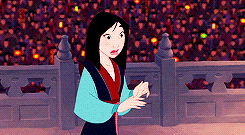Earlier this year, Disney announced their next live-action adaptation of a classic Disney cartoon: "Mulan." Disney fans reacted with reluctant but strong enthusiasm for the upcoming film. The reluctance stems from fear that the creators will take liberties with the film that will detract from the original story in this new adaptation, and, last week, it seemed they were doing just that.
The excitement for the film was interrupted with controversy when an anonymous writer on the blog Angry Asian Man published an open letter to the creators of the new "Mulan." Claiming he had seen the script Disney bought for the movie, the writer explained the plot involved a 30-something-year-old white man as the protagonist of the story. The premise was that this European man finds himself in China during a time of national strife and, after setting eyes on the young, beautiful Mulan, he comes to China's aid and saves the country.
The thing is, saving the country is kind of Mulan's job.
Understandably, fans were angry about this potential script and its stripping Mulan of her own story; however, Disney was quick to jump to their own defense, claiming that the script in question was merely a "jumping-off point for a new take on the story." They said in the actual film, all characters would be played by Asian actors and actresses, including the love interest, and that Mulan will always be the lead role in this story. They have also since hired new writers for the film.
Though Disney seems to have cleared up most of the controversy, the question still remains: why was this their jumping-off point?
"Mulan" holds a spot at the top of so many people's favorite-Disney-classics-list for very specific reasons. Most of them involve the facts that Mulan is a strong female character in her own right, and the movie provides representation for Asian-American Disney fans. Yet this "jumping-off point" reduced Mulan to a supporting character and introduced a new lead who was not only a man, but a white, European man in this story about saving ancient China. This script, however seriously it was being considered, stripped the movie of everything that made it such a great and culturally important movie.
In order for the new movie to be as great a movie and as well-received as the original, the creators will need to be more mindful of the cultural and societal implications of their choices. Keeping Mulan as the hero of her own story, as well as all of China's hero, is important for girls everywhere and for the efforts of feminism in Hollywood, especially now that this story will involve real people instead of cartoons. We need more stories about women who save the day, especially diverse women, and Disney has the opportunity to contribute in a major way with this film.
Whether they cast a Chinese actress or an Asian-American actress is important for the future of Hollywood, as well. Rumors indicate Disney is looking into choosing an established Chinese actress for the role of Mulan in an attempt to appeal to the Chinese market, which the original cartoon failed to do. However, casting an Asian-American actress would open the door for more representation of Asian-Americans in American films.
With this adaptation, Disney has a lot of power in their hands, and it's important they use it wisely.























